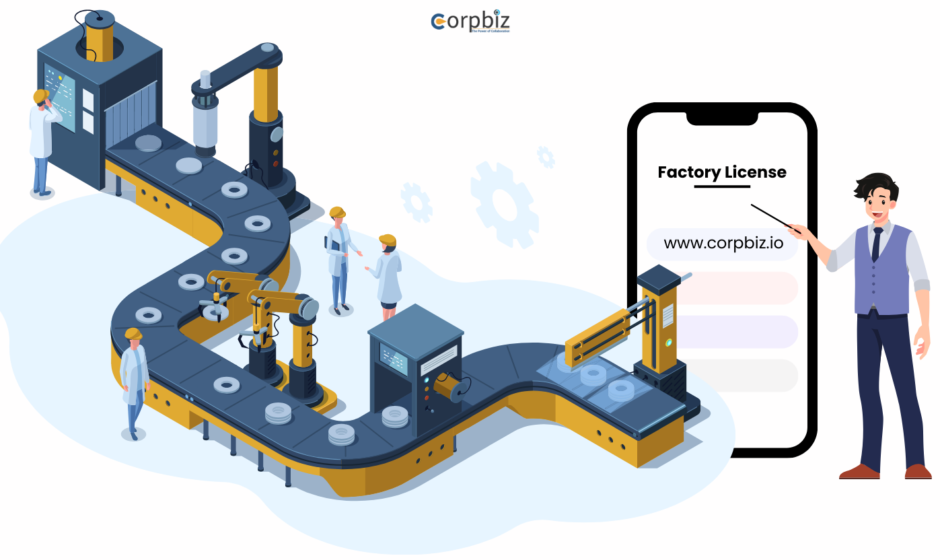Starting and running a factory in India requires compliance with various legal guidelines and regulations. One of the most critical legal requirements for operating a factory is obtaining a factory license. It ensures that your business adheres to safety, health, and welfare standards set by the Indian government. Whether you are running a small manufacturing unit or a large-scale factory, having a factory license is essential for smooth operations. In this blog, we will explore the top 10 benefits of obtaining a factory license for your business and why factory license registration should be a priority.
Here Are the Top 10 Benefits of Obtaining a Factory License for Your Business:
-
Legal Compliance
The primary benefit of obtaining a factory license is ensuring that your business complies with Indian laws. The Factories Act, 1948 mandates the registration and licensing of factories, which is essential for legal operations. A factory license helps businesses stay compliant with regulations regarding workers’ safety, welfare, and health. Non-compliance with this law can lead to hefty fines, legal actions, or even the closure of your business. By obtaining a factory license, you ensure that your business operates legally and ethically.
-
Ensures Worker Safety and Health
One of the most critical aspects of a factory license is ensuring that your business follows safety and health standards for workers. The license helps in enforcing measures that protect workers from hazardous working conditions. These include ensuring proper ventilation, clean drinking water, and first aid facilities within the premises. With a factory license, factory owners are required to comply with safety guidelines, reducing accidents and health risks. Additionally, if your business falls under sectors that deal with hazardous materials, a Good Manufacturing Certificate or GMP Certification further ensures worker safety through stringent manufacturing protocols.
-
Builds Business Credibility
Having a factory license improves your business’s credibility. A licensed factory is seen as trustworthy by clients, stakeholders, and customers. It assures them that your business is following the necessary safety and quality protocols. Additionally, a factory license often becomes a prerequisite for obtaining contracts or partnerships with larger organizations. Businesses are more likely to collaborate with licensed factories as they provide a higher degree of reliability and trustworthiness.
-
Ensures Smooth Business Operations
A factory license ensures that your business operations run smoothly without any disruptions from regulatory authorities. When you register your factory, the government regularly monitors your operations to ensure that you meet legal guidelines. This proactive inspection helps avoid sudden closures due to non-compliance, ensuring that you can continue production without unnecessary halts. Having all your documentation, including a factory license, GMP certification, and a good manufacturing certificate, can make routine inspections hassle-free.
-
Access to Government Schemes and Subsidies
Having a factory license can open doors to various government schemes and subsidies aimed at promoting industrial growth in India. The government often provides financial assistance and tax benefits to licensed factories, especially in sectors such as manufacturing, food processing, and textiles. Moreover, certain schemes are available only for businesses that have completed their factory license registration and other mandatory compliance requirements. Therefore, being registered can make your business eligible for numerous government incentives.
-
Helps in Obtaining BOCW Registration
The BOCW (Building and Other Construction Workers) Registration is essential for businesses involved in construction and related activities. Having a factory license can streamline the process of obtaining BOCW Registration Online. This registration offers social security and benefits to construction workers employed by the factory. Additionally, it ensures compliance with safety regulations for construction workers, reducing the risk of accidents. Being a licensed factory can simplify compliance with BOCW regulations, providing better protection for your workers.
-
Eases Financial Transactions and Loans
A factory license is often required when seeking loans and financial aid for business expansion. Banks and financial institutions view a factory license as proof of legitimacy and compliance, which increases your chances of securing a loan. Additionally, it can make the process of obtaining capital easier, as a licensed factory is considered a low-risk investment. With your license in hand, you can negotiate better loan terms, ensuring your business can expand with adequate financial support.
-
Improves Environmental Compliance
Obtaining a factory license also ensures that your factory complies with environmental laws in India. Many states in India have strict guidelines regarding waste management, pollution control, and energy usage. A factory license ensures that your business adheres to these guidelines, protecting the environment and promoting sustainable business practices. Additionally, adhering to environmental guidelines can enhance your reputation as a socially responsible business.
-
Streamlines Quality Control with Certifications
Along with a factory license, obtaining certifications like a good manufacturing certificate and GMP certification is crucial for ensuring product quality. These certifications indicate that your factory meets the highest standards in production processes and product quality. By having these certifications, you can boost customer confidence, enter international markets, and increase your business’s profitability. Additionally, certified factories are often given preference when bidding for high-value contracts.
-
Prevents Legal Disputes
One of the significant advantages of having a factory license is that it helps prevent legal disputes. Factories that are unlicensed are often subject to penalties, shutdowns, and legal battles with government authorities. By completing Factory License Registration, you reduce the risk of facing legal challenges related to non-compliance with safety, environmental, and worker protection laws. This ensures that your business can operate peacefully and avoid unnecessary legal expenses.
Conclusion
Obtaining a factory license is not just a legal requirement but an essential step for ensuring the success of your business. From building credibility to ensuring worker safety, the benefits of having a factory license are numerous. It streamlines business operations, provides access to government schemes, and prevents legal issues. For any entrepreneur looking to start or run a factory in India, obtaining a factory license, along with BOCW registration online, GMP certification, and a good manufacturing certificate, is critical for long-term success.
FAQs
-
What is the process for obtaining a factory license in India?
The process involves submitting an application along with the required documents, such as the factory layout plan, details of machinery, and safety measures. The application is submitted to the relevant state authority, which will review and grant the factory license after an inspection.
-
Do all factories need a GMP certification?
No, GMP certification is not mandatory for all factories. However, it is crucial for factories involved in manufacturing food, pharmaceuticals, or any products that require strict hygiene and safety standards. It helps ensure product quality and compliance with international standards.
-
What are the consequences of operating a factory without a license?
Operating without a factory license can lead to legal penalties, fines, and even the closure of the factory. Non-compliance can result in safety violations, environmental hazards, and labor issues, which may further lead to costly lawsuits and loss of business reputation.



